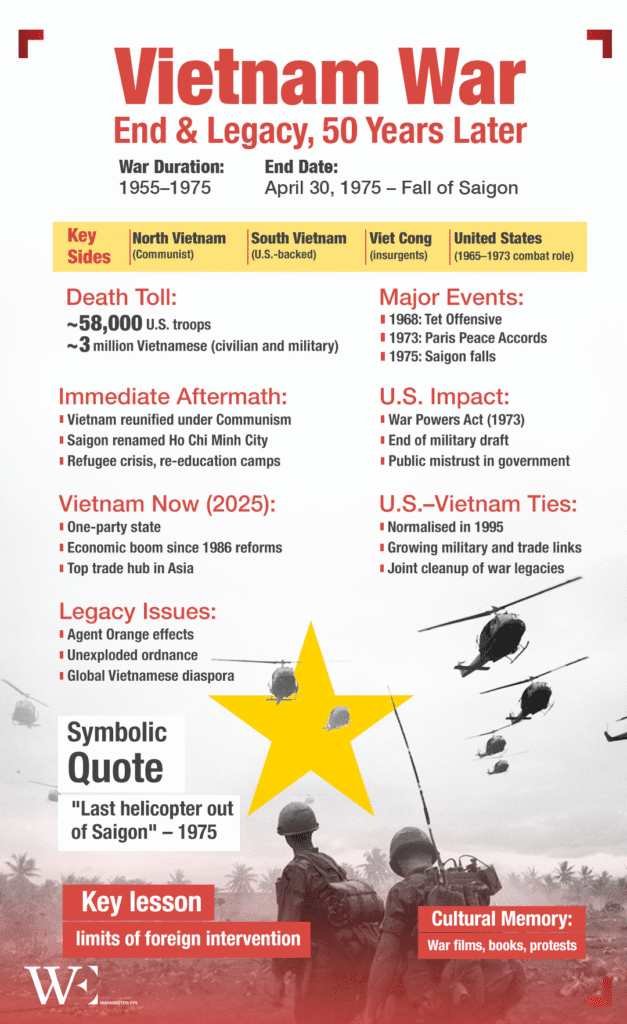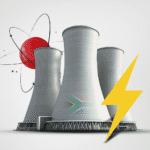On April 30, 2025, Vietnam marked the 50th anniversary of the historic event that led to the end of one of the most controversial and devastating conflicts of the 20th century—the Vietnam War. This significant milestone was celebrated with a series of national commemorations, reflecting on the country’s resilience, the war’s far-reaching impacts, and its progress in the half-century that followed the fall of Saigon.
The war, which lasted nearly two decades from the early 1960s to 1975, involved the communist forces of North Vietnam and their allies, including the Soviet Union and China, against the government of South Vietnam, which was backed by the United States and its anti-communist allies. It was a brutal and destructive conflict that claimed the lives of an estimated 3 million Vietnamese people, along with tens of thousands of U.S. soldiers and those from other countries. The effects of the war lingered long after its conclusion, with widespread physical and psychological scars that have shaped the Vietnamese and American societies.
A Pivotal Moment: April 30, 1975
The official end of the Vietnam War came on April 30, 1975, when the capital city of South Vietnam, Saigon, fell to North Vietnamese forces. The event marked the reunification of Vietnam under communist rule after years of intense conflict. The day is remembered as “Victory Day” or “Reunification Day” in Vietnam, a day when the nation was officially united and the war ended.
For South Vietnamese soldiers and civilians, the fall of Saigon was a day of tragedy, as many were forced to flee, resulting in the infamous “boat people” crisis, where thousands risked their lives in perilous sea voyages to escape the regime that took over the south. Meanwhile, the event was hailed as a monumental victory in the North, signaling the triumph of communist forces in their quest to unite the country.
The Human Cost and the Lingering Impact
The Vietnam War remains one of the most traumatic events in global history. Over the course of the conflict, the United States lost over 58,000 troops, with thousands more wounded and scarred by the war. In Vietnam, the toll was even heavier, with the country suffering immense losses in terms of both human lives and infrastructure. Cities were left in ruins, and entire generations of children grew up amid the horrors of war. The war also saw the widespread use of chemical agents like Agent Orange, which left devastating environmental damage and contributed to chronic health issues for millions of Vietnamese people.
The legacy of the war is still felt today in the form of unexploded ordnance, lingering health effects from toxic chemicals, and deep social divisions. Yet, Vietnam has demonstrated an incredible resilience in the decades following the war’s end. In 1986, the country initiated a series of reforms, known as “Đổi Mới,” which opened the economy and paved the way for Vietnam to become one of the fastest-growing economies in Asia.
Vietnam’s Transformation Over 50 Years
In the 50 years since the end of the war, Vietnam has transformed from a war-torn nation into a burgeoning economic powerhouse. The country has experienced rapid industrialization, increased foreign investment, and impressive growth rates. Vietnam is now considered a key player in the ASEAN region and plays an increasingly important role in global trade, particularly in industries such as electronics, textiles, and agriculture.
The nation’s rapid development has been marked by substantial improvements in health, education, and infrastructure, all while maintaining its socialist political system. The country’s commitment to upholding its sovereignty, and its ability to balance relations with both China and the United States, has been a remarkable diplomatic achievement.
However, the commemoration of the 50th anniversary also provided an opportunity for reflection on the challenges Vietnam still faces. Issues like poverty, environmental degradation, and human rights concerns continue to affect the nation. Critics have also pointed to the tight control over political dissent and the limited space for free expression as areas for improvement.
Challenges Vietnam Still Faces
As Vietnam celebrates its economic growth and national unity, it also grapples with several ongoing challenges that threaten its future stability and progress. One of the most pressing issues Vietnam faces is environmental degradation. Rapid industrialization, coupled with insufficient environmental regulations, has led to significant air and water pollution. The nation’s coastal areas are also at risk due to rising sea levels, a consequence of climate change. Vietnam, especially in the Mekong Delta, is one of the most vulnerable countries in Southeast Asia to climate change, which could displace millions of people in the coming decades.
Despite the nation’s rapid growth, poverty remains a significant issue in rural and remote areas. The gap between the urban rich and rural poor continues to widen, and many people in the countryside still live without access to basic services like healthcare, education, and clean water. Efforts to tackle inequality and ensure inclusive development are essential for Vietnam to sustain its growth trajectory.
While Vietnam has made remarkable economic strides, its political system remains under the strict control of the Communist Party. Dissent is often met with repression, and activists who push for political reform or greater freedoms are frequently harassed or imprisoned. The government’s tight grip on the media and civil society remains a source of criticism, both domestically and internationally.
Though there have been improvements in healthcare and education, the system still faces challenges in providing equitable access to all citizens. The growing number of elderly people, combined with limited healthcare infrastructure in some areas, puts additional pressure on the system. Furthermore, Vietnam’s education system needs to evolve to meet the demands of a modern economy, particularly in fields like technology and innovation.



















